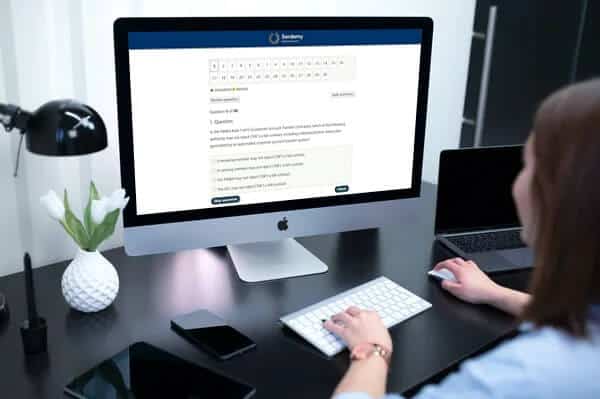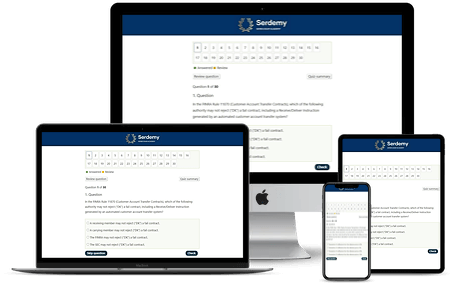Preparing for the FINRA Series 9 and 10 exams can be a daunting task for candidates aspiring to advance in the securities industry. These exams, crucial for individuals seeking to become a General Securities Sales Supervisor, test a broad range of knowledge and skills. Understanding what to expect and how to prepare effectively can make a significant difference in your success. Below are some of the most commonly asked questions by candidates preparing for these exams, covering preparation time, exam difficulty, retake policies, career prospects, and alternative pathways.
Series 9 and 10 content outline

What are the main differences between the Series 9 and Series 10 exams?
The Series 9 exam, officially known as the General Securities Sales Supervisor – Options Limited Representative exam, focuses on supervisory responsibilities related to options trading. It emphasizes understanding and overseeing the compliance aspects of options transactions. The Series 10 exam, or General Securities Sales Supervisor exam, is broader and covers a range of supervisory activities including stocks, bonds, mutual funds, and options. It is designed to test a candidate’s ability to manage and supervise the activities of securities professionals, ensuring adherence to regulatory standards.
How long should I spend preparing for the Series 9 and 10 exams?
Preparation time for the Series 9 and 10 exams varies depending on your background and experience. On average, candidates spend 60-100 hours studying for each exam. It’s crucial to create a study plan that includes reviewing study guides, taking practice exams, and focusing on areas where you need improvement. Consistent study over a period of several weeks to a couple of months generally helps candidates to be well-prepared.
What topics are covered on the Series 9 and 10 exams?
The Series 9 exam covers options trading, including topics like options pricing, strategies, and regulatory requirements. It also includes compliance and supervisory duties related to options trading. The Series 10 exam encompasses a broader range of topics, including equity securities, fixed income, investment returns, portfolio management, and the supervisory aspects of these areas. Both exams require a thorough understanding of their respective content areas and relevant regulations.
What is the format and structure of the Series 9 and 10 exams?
The Series 9 exam consists of 50 multiple-choice questions, while the Series 10 exam has 140 multiple-choice questions. Both exams are administered via computer-based testing at FINRA-approved testing centers. The Series 9 exam is typically 1.5 hours long, and the Series 10 exam is 2.5 hours long. The questions test knowledge and application of securities regulations, trading practices, and supervisory responsibilities.
How difficult are the Series 9 and 10 exams compared to other FINRA exams?
The difficulty of the Series 9 and 10 exams can be considered moderate to high compared to other FINRA exams. The Series 10, in particular, is broad and requires a solid understanding of various securities and supervisory practices. While the Series 9 focuses more narrowly on options, both exams require a deep grasp of complex concepts and regulations. Success often depends on thorough preparation and familiarity with the exam content.
What are the passing scores for the Series 9 and 10 exams?
To pass the Series 9 exam, candidates must achieve a score of at least 70%. For the Series 10 exam, the passing score is also 70%. These scores are based on the number of correct answers and are designed to ensure that candidates have a sufficient understanding of the material to perform effectively in a supervisory role.
How can I find study materials for the Series 9 and 10 exams?
Study materials for the Series 9 and 10 exams can be found through various sources including online study courses, textbooks, and practice exams. Reputable providers like Kaplan, STC (Securities Training Corporation), and Pass Perfect offer comprehensive study packages. Additionally, many candidates use financial industry forums and study groups for supplementary resources and insights.
Are there any recommended study guides or prep courses?
Yes, several reputable study guides and prep courses are recommended for the Series 9 and 10 exams. Providers such as Kaplan, STC, and Wiley offer detailed study materials and practice exams specifically tailored to these exams. Many candidates find that a combination of study guides, online courses, and practice tests provides the best preparation.
How much does it cost to take the Series 9 and 10 exams?
The cost to take the Series 9 exam is typically around $100, while the Series 10 exam costs approximately $150. These fees are subject to change, so it is advisable to check the latest information on the FINRA website or with your testing provider. Additionally, there may be costs associated with study materials and prep courses.
Can I retake the Series 9 and 10 exams if I fail?
Yes, you can retake the Series 9 and 10 exams if you do not pass. Candidates must wait 30 days before retaking an exam. Each attempt requires a new registration and payment of the exam fee. It is essential to review your performance on the previous attempt and address any areas of weakness before re-taking the exam.
What is the waiting period to retake the exams if I don’t pass?
The waiting period to retake the Series 9 and 10 exams is 30 days from the date of your previous attempt. This policy allows candidates time to review and improve their knowledge before attempting the exam again. Ensure that you use this time to address any areas of difficulty and enhance your study efforts.
How do I register for the Series 9 and 10 exams?
Registration for the Series 9 and 10 exams can be done through the FINRA website or by contacting a FINRA-approved testing provider. You will need to create an account, complete the application process, and pay the associated fees. Ensure that you have all required documentation and meet eligibility criteria before registering.
What are the most effective study strategies for the Series 9 and 10 exams?
Effective study strategies include creating a structured study plan, using a variety of study materials such as textbooks, online courses, and practice exams, and focusing on understanding key concepts rather than rote memorization. Regular review sessions, timed practice exams, and participation in study groups can also enhance your preparation and ensure a thorough understanding of the material.
Are there any specific areas where candidates typically struggle?
Candidates often struggle with complex regulatory requirements and application of supervisory principles. For the Series 9 exam, options strategies and compliance issues are commonly challenging. For the Series 10, topics like portfolio management and equity analysis can be difficult. Focusing on these areas during your study can help improve your performance.
How long are the Series 9 and 10 exams valid for once passed?
Once you pass the Series 9 and 10 exams, the certifications are valid for as long as you maintain your registration with a FINRA-member firm and continue to meet continuing education requirements. If there is a significant gap in employment or registration, requalification may be necessary.
What career opportunities can I pursue with the Series 9 and 10 certifications?
With Series 9 and 10 certifications, you can pursue roles such as General Securities Sales Supervisor, Compliance Officer, or other supervisory positions within broker-dealer firms. These certifications qualify you to oversee trading activities and ensure regulatory compliance, opening doors to advanced career opportunities in the financial services industry.
How does obtaining the Series 9 and 10 certifications impact my career?
Obtaining the Series 9 and 10 certifications enhances your qualifications for supervisory roles in the securities industry. It demonstrates your expertise in compliance and regulatory practices, making you a more competitive candidate for higher-level positions and increasing your career advancement opportunities within financial firms.
Are there alternative certifications or licenses that can substitute for the Series 9 and 10?
While there are other FINRA licenses and certifications, the Series 9 and 10 are specific to supervisory roles in securities trading. Alternatives might include the Series 7 (General Securities Representative) or Series 24 (General Securities Principal) licenses, which also qualify for supervisory roles but with different focuses. However, for roles specifically involving options and general securities supervision, the Series 9 and 10 are the relevant certifications.
How does the Series 9 and 10 fit into the broader FINRA certification process?
The Series 9 and 10 are part of a series of FINRA exams designed to qualify individuals for specific supervisory roles. The Series 9 focuses on options, while the Series 10 covers a broader range of securities. They are typically taken after the Series 7 exam and are part of the qualification process for becoming a supervisor in securities trading and management.
What should I expect on exam day?
On exam day, arrive at the testing center with sufficient time and bring valid identification. The exams are computer-based, and you will have a designated time to complete them. Ensure you are familiar with the testing environment, manage your time effectively during the test, and follow all instructions provided by the test proctor.
Is there a difference in difficulty between the Series 9 and Series 10 exams?
The Series 9 exam is more focused on options and supervisory practices related to options trading, while the Series 10 is broader and covers a wider range of securities and supervisory responsibilities. Generally, candidates find the Series 10 to be more challenging due to its comprehensive scope and the complexity of topics covered.
How can I manage exam stress and anxiety?
To manage exam stress and anxiety, practice relaxation techniques such as deep breathing and mindfulness. Establish a consistent study routine and take regular breaks to avoid burnout. Additionally, practice with mock exams to build confidence and become familiar with the test format. Maintaining a healthy lifestyle with proper nutrition, exercise, and adequate sleep also helps manage stress.
What is the passing rate for the Series 9 and 10 exams?
The passing rates for the Series 9 and 10 exams vary but generally hover around 70-75%. These rates indicate the level of difficulty and the importance of thorough preparation. Reviewing exam content, taking practice tests, and studying strategically can improve your chances of passing.
Can I use a calculator during the exams?
Yes, you can use a basic calculator during the Series 9 and 10 exams. However, the calculator provided is a simple, non-programmable model. Ensure you are familiar with its functions and practice calculations during your study to avoid any issues during the exam.
What kind of questions can I expect on the Series 9 and 10 exams?
The Series 9 and 10 exams consist of multiple-choice questions that test your knowledge of securities regulations, trading practices, and supervisory responsibilities. Questions may involve scenarios, regulatory compliance issues, and theoretical concepts. The exams are designed to assess both your understanding and practical application of the material.
How are the Series 9 and 10 exams scored?
The Series 9 and 10 exams are scored based on the number of correct answers. Each exam has a predetermined passing scale, and you must achieve a minimum score of 70% to pass. The exams are scored electronically, and you will receive your results immediately upon completion.
What resources are available for practice exams?
Various resources are available for practice exams, including online platforms and study guides provided by exam prep companies such as Kaplan, STC, and Wiley. Many of these resources offer practice tests that simulate the actual exam environment, allowing you to gauge your readiness and identify areas for improvement.
Do I need to be sponsored by a FINRA-member firm to take these exams?
Yes, you need to be sponsored by a FINRA-member firm to take the Series 9 and 10 exams. The sponsoring firm will submit the required forms and fees on your behalf. This sponsorship is necessary to ensure that you are employed or associated with a firm that is subject to FINRA regulations.
What happens if I miss my exam appointment?
If you miss your exam appointment, you will need to reschedule your test. Depending on the circumstances, you may be required to pay a rescheduling fee. It is important to contact the testing provider as soon as possible to arrange a new appointment and ensure that you do not forfeit your exam fee.
Are there any changes or updates to the exam content that I should be aware of?
Exam content for the Series 9 and 10 exams can be updated periodically to reflect changes in regulations and industry practices. It is important to check the FINRA website or consult with your exam prep provider for the latest information on any changes to the exam content or format before you begin your preparation.














